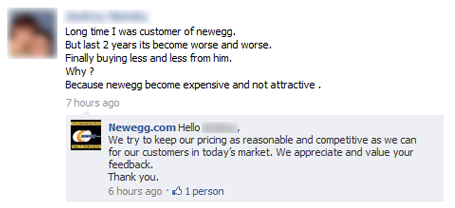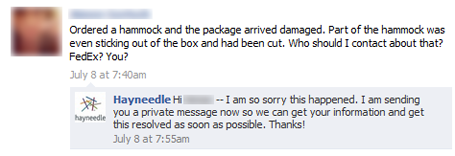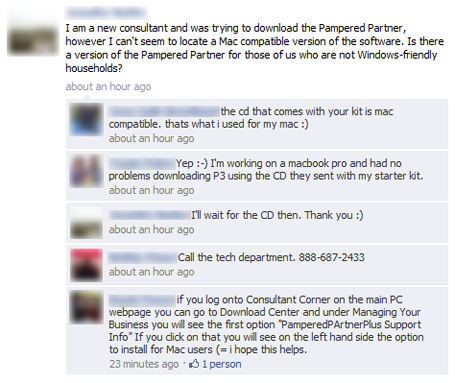 What do you do when you've just received a less-than-complimentary Facebook wall post from someone who likes your business (or used to, so it seems)?
What do you do when you've just received a less-than-complimentary Facebook wall post from someone who likes your business (or used to, so it seems)?
The customer could have a simple complaint, or be so upset he's gone on the offensive, making sure you and the rest of your community knows he's angry.
Your next steps are key to retaining not only the business of the angry customer, but the business of other fans who like your page as well.
#1: Respond no matter what
It's vitally important that the complaints and issues your fans pose on your wall are addressed. Inactivity on your part will appear as though you're trying to ignore the issue and sweep it under the rug. Being unresponsive does nothing more than incite more anger and increase the chance the user will come back with even more angry wall posts.
Moreover, your community can see that angry post. If you don't reply, it appears as though you are unconcerned with customer support, which can be detrimental to your reputation.
A response that illustrates respect and understanding for customers' concerns will indicate your intention to rectify any problems. By addressing this upset fan, Newegg is demonstrating that they value their fans' opinions—even the negative ones.

#2: Be patient and understanding
In dealing with upset fans, you must remember that you are closer to your industry, products and services than they are. What may seem like basic, common knowledge to you is often foreign to the end user.
Take a step back and put yourself in your customer's shoes. This can go a long way in understanding why he or she is frustrated. It may not be your company's fault that the customer is upset.
Whether or not the fault lies on your end, a simple apology will go a long way in keeping the customer's business. Instead of trying to figure out where the blame lies, turn upset fans into loyal customers by making their experience better.
#3: Contact the Customer Privately
Sending a private message or email to the customer opens up more options for you to address his or her complaints. The goal here is to extend some sort of token letting the customer know you're sorry he or she is dissatisfied with your company, and you're willing to make it right. Whether that's offering the number of the manager's direct phone line or a discount off the next purchase, moving the conversation from public to private allows you to give the customer a personal touch that signals you care.
However, offering things like direct lines and special discounts publicly can lead to other people creating problems just to get that special treatment, so it's best to keep these practices off the wall.
While Hayneedle's customer shown below isn't visibly upset about the damaged order, Hayneedle handles the situation perfectly, and contacts the customer privately to resolve the issue.

Discover Proven Marketing Strategies and Tips
Want to go even deeper with your marketing? Check out the Social Media Marketing Podcast! Publishing weekly since 2012, the Social Media Marketing Podcast helps you navigate the constantly changing marketing jungle, with expert interviews from marketing pros.
But don’t let the name fool you. This show is about a lot more than just social media marketing. With over 600 episodes and millions of downloads each year, this show has been a trusted source for marketers for well over a decade.

#4: Consider asking the fan to remove the post
Say you've discussed the issue privately, any problems have been straightened out, and the faultfinder is, once again, your happy customer.
While your wall is an integral part of your web presence, the customer may be unaware of how important it really is to your reputation. If he or she is satisfied with the resolution you've reached and grateful for the time you've spent making things right, there's nothing wrong with privately asking the person to remove the post. Most of the time, he or she will remove the angry wall post.
Get World-Class Marketing Training — All Year Long!
Are you facing doubt, uncertainty, or overwhelm? The Social Media Marketing Society can help.
Each month, you’ll receive training from trusted marketing experts, covering everything from AI to organic social marketing. When you join, you’ll also get immediate access to:
- A library of 100+ marketing trainings
- A community of like-minded marketers
- Monthly online community meetups
- Relevant news and trends updates
#5: Respond back to the original post
As a general rule, you, the Facebook page admin, should not remove negative posts. Not everyone is going to have a glowing review of your product or company. Social media users know this, and if they see nothing but positive comments, they'll assume your company is deleting the bad comments.
If you don't feel comfortable asking your customer to remove the post, you do have the option of publicly responding back to that post. Express happiness in the resolution you've reached and thankfulness for her business. Even a negative post can be a good thing, as long as the last comment is positive. Your reputation among your community will soar when they see how well you take care of your customers.
Zappos is shown below addressing a negative comment. The helpful attitude effectively nullifies any poor reflection on Zappos or their services.

#6: Let your community respond
Letting your community respond for you is really the end result of all the earlier steps. It requires copious time, energy and patience with your fans, and a fantastic product. After you've engaged with your fans for a period of time by answering questions and offering support, you'll notice that your fans will be more active on your page, even to the point of assisting each other.
What's great about getting this community support is that there's a genuine credibility when fans endorse your business for you. They become your eager virtual support agents, answering questions and solving problems before you have a chance to. But this is a level you can only achieve if you've nurtured and supported your community.
The Pampered Chef has built a fantastic online community of users who love the product so much, and who have been given such great support themselves, peers will answer each other's questions before The Pampered Chef has to respond.

#7: The Last Resort
If the offended party is unreceptive to your customer service attempts, blatantly hostile and only active in your community to start arguments, banning the individual is a last-resort option. And anyone leveling expletives or racial slurs against your staff or fans should be banned. Your staff and your fans don't deserve to be subjected to the abuse, and in the end, they will respect you more because you took the initiative.
What's been your experience? How has your business handled complaints from upset fans on your Facebook wall in the past? What has worked? What hasn't? Leave your comments in the box below.
Attention Agency Owners, Brand Marketers, and Consultants

Introducing the Marketing Agency Show–our newest podcast designed to explore the struggles of agency marketers.
Join show host and agency owner, Brooke Sellas, as she interviews agency marketers and digs deep into their biggest challenges. Explore topics like navigating rough economic times, leveraging AI, service diversification, client acquisition, and much more.
Just pull up your favorite podcast app, search for Marketing Agency Show and start listening. Or click the button below for more information.

